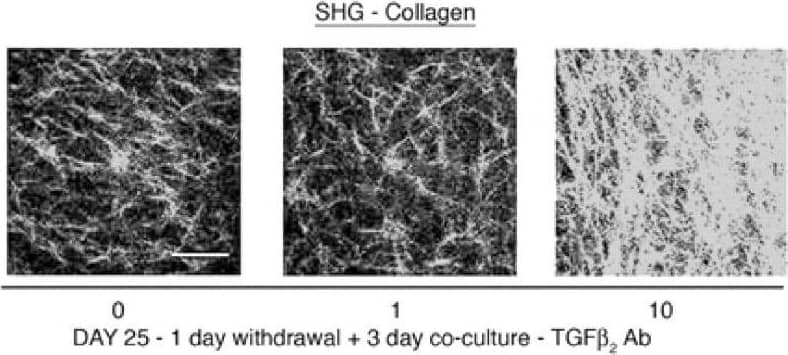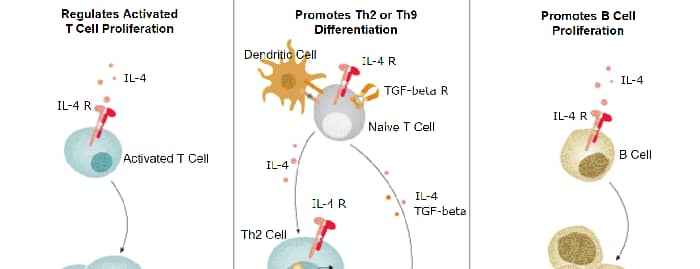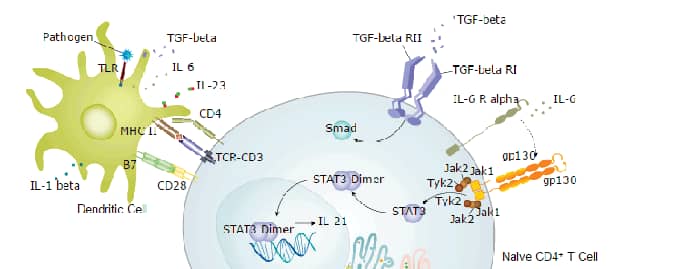TGF-beta 2 Antibody Summary
TGF‑ beta 1.2 but will cross-react with other TGF-beta variants with at least 100-fold lower sensitivity. It will also neutralize the biological activity of TGF-beta 1.2, at a 50 fold higher IgG concentration.
Applications
Please Note: Optimal dilutions should be determined by each laboratory for each application. General Protocols are available in the Technical Information section on our website.
Scientific Data
 View Larger
View Larger
Detection of Human TGF‑ beta 2 by Western Blot. Western blot shows lysates of human heart tissue and human breast cancer tissue. PVDF membrane was probed with 0.25 µg/mL of Goat Anti-TGF-beta 2 Polyclonal Antibody (Catalog # AB-112-NA) followed by HRP-conjugated Anti-Goat IgG Secondary Antibody (Catalog # HAF017). A specific band was detected for TGF-beta 2 at approximately 70 kDa (as indicated). This experiment was conducted under reducing conditions and using Immunoblot Buffer Group 1.
 View Larger
View Larger
Detection of Human TGF‑ beta 2 by Simple WesternTM. Simple Western lane view shows lysates of human heart tissue and human breast cancer tissue, loaded at 0.2 mg/mL. A specific band was detected for TGF-beta 2 at approximately 63 kDa (as indicated) using 2.5 µg/mL of Goat Anti-TGF-beta 2 Polyclonal Antibody (Catalog # AB-112-NA) followed by 1:50 dilution of HRP-conjugated Anti-Goat IgG Secondary Antibody (Catalog # HAF109). This experiment was conducted under reducing conditions and using the 12-230 kDa separation system.
 View Larger
View Larger
TGF‑ beta 2 Inhibition of IL‑4-dependent Cell Proliferation and Neutralization by TGF‑ beta 2 Antibody. Porcine TGF-beta 2 (Catalog # 102-B2) inhibits Recombinant Mouse IL-4 (Catalog # 404-ML) induced proliferation in the HT-2 mouse T cell line in a dose-dependent manner (orange line). Inhibition of Recombinant Mouse IL-4 (7.5 ng/mL) activity elicited by Porcine TGF-beta 2 (1 ng/mL) is neutralized (green line) by increasing concentrations of Sheep Anti-TGF-beta 2 Polyclonal Antibody (Catalog # AB-112-NA). The ND50 is typically 0.3-1.5 µg/mL.
 View Larger
View Larger
Detection of Mouse TGF-beta 2 by Flow Cytometry The phenotypic characterization of DCs treated with 50% CSC culture supernatant in presence of neutralizing TGF-beta 2 antibody, measured by flow cytometry. The expression of each surface molecule (filled) compared to the respective isotype control (empty). Representative example of three experiments. Image collected and cropped by CiteAb from the following open publication (https://pubmed.ncbi.nlm.nih.gov/22933838), licensed under a CC-BY license. Not internally tested by R&D Systems.
 View Larger
View Larger
Detection of Mouse TGF-beta 2 by Flow Cytometry The phenotypic characterization of DCs treated with 50% CSC culture supernatant in presence of neutralizing TGF-beta 2 antibody, measured by flow cytometry. The expression of each surface molecule (filled) compared to the respective isotype control (empty). Representative example of three experiments. Image collected and cropped by CiteAb from the following open publication (https://pubmed.ncbi.nlm.nih.gov/22933838), licensed under a CC-BY license. Not internally tested by R&D Systems.
 View Larger
View Larger
Detection of Mouse TGF-beta 2 by Flow Cytometry The phenotypic characterization of DCs treated with 50% CSC culture supernatant in presence of neutralizing TGF-beta 2 antibody, measured by flow cytometry. The expression of each surface molecule (filled) compared to the respective isotype control (empty). Representative example of three experiments. Image collected and cropped by CiteAb from the following open publication (https://pubmed.ncbi.nlm.nih.gov/22933838), licensed under a CC-BY license. Not internally tested by R&D Systems.
 View Larger
View Larger
Detection of Mouse TGF-beta 2 by Flow Cytometry The phenotypic characterization of DCs treated with 50% CSC culture supernatant in presence of neutralizing TGF-beta 2 antibody, measured by flow cytometry. The expression of each surface molecule (filled) compared to the respective isotype control (empty). Representative example of three experiments. Image collected and cropped by CiteAb from the following open publication (https://pubmed.ncbi.nlm.nih.gov/22933838), licensed under a CC-BY license. Not internally tested by R&D Systems.
 View Larger
View Larger
Detection of Human TGF-beta 2 by Immunocytochemistry/ Immunofluorescence Quantification of soluble collagen content in the media&matrix. (C, D) Representative Second harmonic generated (SHG) images (scale bar = 50 μm) of collagen fibrils at day 25 are shown along with the quantification of signal intensities. The SHG signals from the collagen secreted by NHLF embedded in rat tail collagen gels which co-cultured with the IL-13 pre-treated NHBE at 10 ng/ml are elevated compared to the untreated NHBE co-culture; * p < 0.01&this increase is inhibited on incubation with TGF beta 2 neutralizing antibody in the 3 day co-culture period (§ p < 0.01 compared to respective condition without TGF beta 2 antibody). Addition of goat IgG did not alter the increased levels of collagen in the matrix&media in the pre-treated NHBE-NHLF co-culture. Image collected & cropped by CiteAb from the following open publication (https://respiratory-research.biomedcentral.com/articles/10.1186/1465-9921-9-27), licensed under a CC-BY license. Not internally tested by R&D Systems.
Reconstitution Calculator
Preparation and Storage
- 12 months from date of receipt, -20 to -70 °C as supplied.
- 1 month, 2 to 8 °C under sterile conditions after reconstitution.
- 6 months, -20 to -70 °C under sterile conditions after reconstitution.
Background: TGF-beta 2
TGF-beta 2 (transforming growth factor beta 2) is one of three closely related mammalian members of the large TGF-beta superfamily that share a characteristic cysteine knot structure (1-7). TGF-beta 1, -2 and -3 are highly pleiotropic cytokines proposed to act as cellular switches that regulate processes such as immune function, proliferation and epithelial-mesenchymal transition (1-4). Each TGF-beta isoform has some non-redundant functions; for TGF-beta 2, mice with targeted deletion show defects in development of cardiac, lung, craniofacial, limb, eye, ear and urogenital systems (2). Human TGF-beta 2 cDNA encodes a 414 amino acid (aa) precursor that contains a 19 aa signal peptide and a 395 aa proprotein (8). A furin-like convertase processes the proprotein to generate an N-terminal 232 aa latency-associated peptide (LAP) and a C-terminal 112 aa mature TGF- beta 2 (8, 9). Disulfide-linked homodimers of LAP and TGF-beta 2 remain non-covalently associated after secretion, forming the small latent TGF-beta 1 complex (8-10). Covalent linkage of LAP to one of three latent TGF-beta binding proteins (LTBPs) creates a large latent complex that may interact with the extracellular matrix (9, 10). TGF-beta is activated from latency by pathways that include actions of the protease plasmin, matrix metalloproteases, thrombospondin 1 and a subset of integrins (10). Mature human TGF-beta 2 shows 100% aa identity with porcine, canine, equine and bovine TGF-beta 2, and 97% aa identity with mouse and rat TGF-beta 2. It demonstrates cross-species activity (1). TGF-beta 2 signaling begins with binding to a complex of the accessory receptor betaglycan (also known as TGF-beta RIII) and a type II ser/thr kinase receptor termed TGF-beta RII. This receptor then phosphorylates and activates another ser/thr kinase receptor, TGF-beta RI (also called activin receptor-like kinase (ALK) -5), or alternatively, ALK-1. The whole complex phosphorylates and activates Smad proteins that regulate transcription (3, 11, 12). Use of other signaling pathways that are Smad-independent allows for disparate actions observed in response to TGF-beta in different contexts (11).
- Sporn, M.B. (2006) Cytokine Growth Factor Rev. 17:3.
- Dunker, N. and K. Krieglstein, 2000, Eur. J. Biochem. 267:6982.
- Wahl, S.M. (2006) Immunol. Rev. 213:213.
- Chang, H. et al. (2002) Endocr. Rev. 23:787.
- Lin, J.S. et al. (2006) Reproduction 132:179.
- Hinck, A.P. et al. (1996) Biochemistry 35:8517.
- Mittl, P.R.E. et al. (1996) Protein Sci. 5:1261.
- deMartin, R. et al. (1987) EMBO J. 6:3673.1.
- Miyazono, K. et al. (1988) J. Biol. Chem. 263:6407.
- Oklu, R. and R. Hesketh (2000) Biochem. J. 352:601.
- de Caestecker, M. et al. (2004) Cytokine Growth Factor Rev. 15:1.
- Zuniga, J.E. et al. (2005) J. Mol. Biol. 354:1052.
Product Datasheets
Citations for TGF-beta 2 Antibody
R&D Systems personnel manually curate a database that contains references using R&D Systems products. The data collected includes not only links to publications in PubMed, but also provides information about sample types, species, and experimental conditions.
6
Citations: Showing 1 - 6
Filter your results:
Filter by:
-
Divergent single cell transcriptome and epigenome alterations in ALS and FTD patients with C9orf72 mutation
Authors: Li J, Jaiswal MK, Chien JF et al.
Nat Commun
-
Incorporation of a TGF-beta 2-inhibiting oligodeoxynucleotide molecular adjuvant into a tumor cell lysate vaccine to enhance antiglioma immunity in mice
Authors: Liqun Tu, Zhe Wang, Lei Yang, Xiaomeng Sun, Yunpeng Yao, Peng Zhang et al.
Frontiers in Immunology
-
TGF-beta2 interfering oligonucleotides used as adjuvants for microbial vaccines
Authors: L Tu, X Sun, L Yang, T Zhang, X Zhang, X Li, B Dong, Y Liu, M Yang, L Wang, Y Yu
J. Leukoc. Biol., 2020-08-13;0(0):.
Species: Human, Mouse
Sample Types: Cell Lysates, Whole Cells
Applications: Flow Cytometry, Western Blot -
Loss of muscleblind-like 1 promotes invasive mesenchyme formation in endocardial cushions by stimulating autocrine TGF beta 3
Authors: Kathryn E LeMasters, Yotam Blech-Hermoni, Samantha J Stillwagon, Natalie A Vajda, Andrea N Ladd
BMC Developmental Biology
-
Murine corneal stroma cells inhibit LPS-induced dendritic cell maturation partially through TGF-beta 2 secretion in vitro
Authors: Jian-Min Lu, Xiu-Jun Song, Hui-Fang Wang, Xiao-Lei Li, Xiao-Rong Zhang
Mol. Vis
-
Role of gastric epithelial cell-derived transforming growth factor beta in reduced CD4+ T cell proliferation and development of regulatory T cells during Helicobacter pylori infection
Authors: Ellen J. Beswick, Iryna V. Pinchuk, Rachel B. Earley, David A. Schmitt, Victor E. Reyes
Infection and Immunity
FAQs
No product specific FAQs exist for this product, however you may
View all Antibody FAQsReviews for TGF-beta 2 Antibody
There are currently no reviews for this product. Be the first to review TGF-beta 2 Antibody and earn rewards!
Have you used TGF-beta 2 Antibody?
Submit a review and receive an Amazon gift card.
$25/€18/£15/$25CAN/¥75 Yuan/¥2500 Yen for a review with an image
$10/€7/£6/$10 CAD/¥70 Yuan/¥1110 Yen for a review without an image







